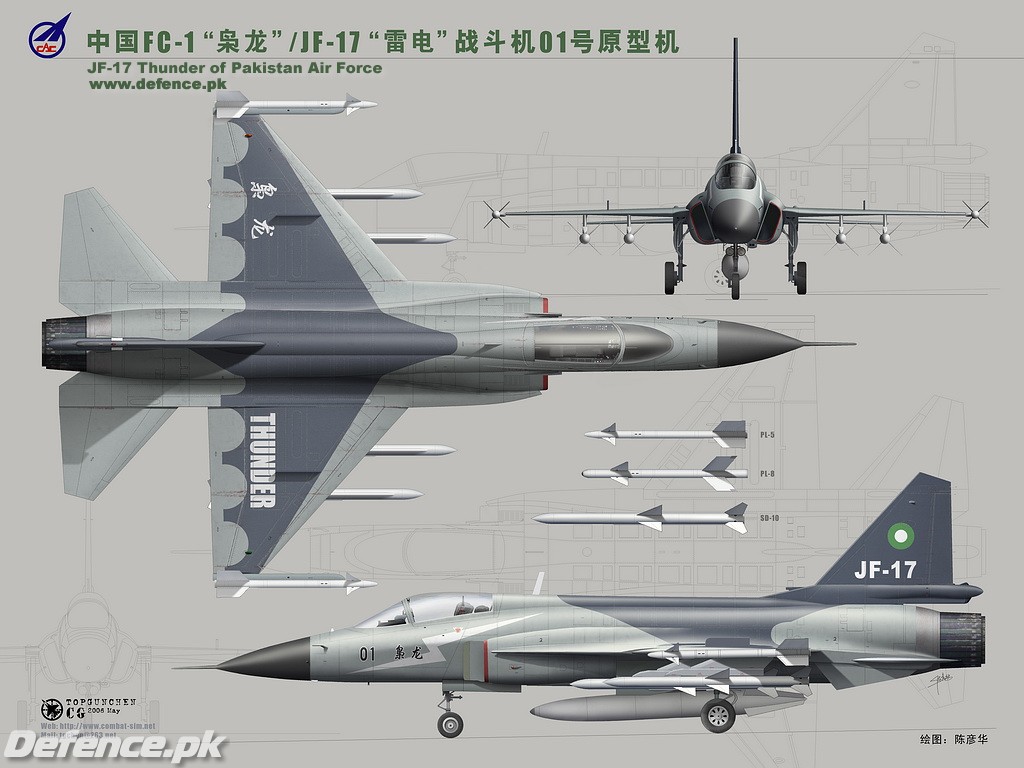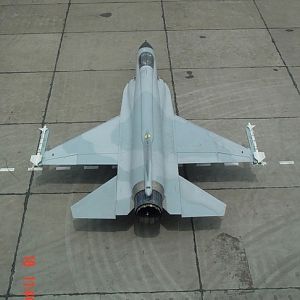How to install the app on iOS
Follow along with the video below to see how to install our site as a web app on your home screen.
Note: This feature may not be available in some browsers.
You are using an out of date browser. It may not display this or other websites correctly.
You should upgrade or use an alternative browser.
You should upgrade or use an alternative browser.
S
greyjf-17
Role Multirole fighter
Manufacturer Chengdu Aircraft Industry Corporation
Pakistan Aeronautical Complex
First flight 25 August 2003
Introduced 12 March 2007
Status Serial production beginning / In active service with Pakistan
Primary user Pakistan Air Force
Produced In China: June 2007–
In Pakistan: January 2008–
Number built 4 prototypes
10 delivered
Unit cost US$15-20 million (estimated
Specifications (JF-17 Thunder/FC-1 Fierce Dragon)
General characteristics
Crew: 1 (2 for proposed twin-seater)
Length: 14.0 m[32] (49 feet)
Wingspan: 9.45 m[32] (31 ft)
Height: 4.77 m (15 ft 8 in)
Wing area: 24.4 m²[32] (263 ft²)
Empty weight: 6,450 kg[32] (14,200 lb)
Loaded weight: 9,100 kg[33] including 2× wing-tip mounted air-to-air missiles (20,062 lb)
Max takeoff weight: 12,700 kg[33] (28,000 lb)
Powerplant: 1× Klimov RD-93 or WS-13 TianShan turbofan
Dry thrust: 51.2 kN (with WS-13 engine) (11,240 lbf)
Thrust with afterburner: 86.37 kN (with WS-13 engine) [4][5][33] (18,300 lbf)
G-limit: +8.5 g[12]
Fuel Capacity: 2300kg (5,130 lb) [34]
Performance
Maximum speed: Mach 1.6~1.8 [35]
Combat radius: 1,352 km (890 nmi, 1,025 mi)
Ferry range: 3,500km [6][7][36] (2,100 mi)
Service ceiling 18,000 m [8][9][37] (59,055 ft)
Thrust/weight: 0.95 [10]
Armament
Guns: 1× 23mm internal GSh-23-2 twin-barrel cannon (can be replaced with 30mm GSh-30-2 twin-barrel cannon)
Hardpoints: 7 in total (4× under-wing, 2× wing-tip, 1× under-fuselage) with a capacity of 3,629 kg (8,000 lb) external fuel and ordnance,
Rockets: 57mm/90mm unguided rocket pods [38]
Missiles:
Air-to-air missiles: PL-9C, PL-12/SD-10, A-darter
Air-to-surface missiles: anti-radiation missiles, anti-ship missiles, cruise missiles, etc.
Bombs:
Precision guided munitions, glide bombs, unguided bombs, etc
Others:
Up to 3 drop tanks (1× under-fuselage 800 litres, 2× under-wing 800/1100 litres each) for ferry flight or extended range/loitering time
Externally mounted avionics pods for Electronic Warfare, Electronic Counter-Measures, FLIR and Targeting:
Blue Sky navigation/attack pod
BM/KG300G self-protection jamming (ECM) pod
KZ900 electronic reconnaissance (SIGINT) pod
Avionics
KLJ-7 Radar
[edit] Confirmed Operators
Pakistan
Pakistan Air Force - The only current user of the JF-17, with 10 small batch production aircraft delivered, 150 currently ordered and a total of 250 expected. [24]
According to Air Chief Marshal Tanvir Mahmood Ahmad, the first JF-17 squadron will be inducted into the PAF fleet in the first quarter of 2009. [31]
[edit] Potential Operators
Azerbaijan
Azerbaijan Air Force
China
People's Liberation Army Air Force - Under evaluation
Zimbabwe
Zimbabwe Air Force
The first prototype was rolled out on 31 May 2003, conducted its first taxi trials on 1 July and made its first flight on 25 August of the same year. The third prototype, PT-03, made its first flight in April 2004. It is believed that at some point during these initial test flights, the name Super-7 was replaced by the Chinese designation FC-1 (Fighter China-1) and the Pakistani designation JF-17 (Joint Fighter-17).
The PT-04 prototype of JF-17 successfully completed its first operational flight in Chengdu, China, on Wednesday 10 March 2006.[8] On 28 April 2006, PT-04 made its first flight with fully operational avionics. This prototype of JF-17 is configured as a multi-role fighter-bomber, equipped with advanced avionics and capable of carrying multiple air-to-air and air-to-ground weapons. Pakistan received the first consignment of 2 aircraft on 23 March 2007. China was supposed to start official production in June 2007 while Pakistan Aeronautical Complex was planning to start manufacturing the JF-17 in 2008.
Manufacturer Chengdu Aircraft Industry Corporation
Pakistan Aeronautical Complex
First flight 25 August 2003
Introduced 12 March 2007
Status Serial production beginning / In active service with Pakistan
Primary user Pakistan Air Force
Produced In China: June 2007–
In Pakistan: January 2008–
Number built 4 prototypes
10 delivered
Unit cost US$15-20 million (estimated
Specifications (JF-17 Thunder/FC-1 Fierce Dragon)
General characteristics
Crew: 1 (2 for proposed twin-seater)
Length: 14.0 m[32] (49 feet)
Wingspan: 9.45 m[32] (31 ft)
Height: 4.77 m (15 ft 8 in)
Wing area: 24.4 m²[32] (263 ft²)
Empty weight: 6,450 kg[32] (14,200 lb)
Loaded weight: 9,100 kg[33] including 2× wing-tip mounted air-to-air missiles (20,062 lb)
Max takeoff weight: 12,700 kg[33] (28,000 lb)
Powerplant: 1× Klimov RD-93 or WS-13 TianShan turbofan
Dry thrust: 51.2 kN (with WS-13 engine) (11,240 lbf)
Thrust with afterburner: 86.37 kN (with WS-13 engine) [4][5][33] (18,300 lbf)
G-limit: +8.5 g[12]
Fuel Capacity: 2300kg (5,130 lb) [34]
Performance
Maximum speed: Mach 1.6~1.8 [35]
Combat radius: 1,352 km (890 nmi, 1,025 mi)
Ferry range: 3,500km [6][7][36] (2,100 mi)
Service ceiling 18,000 m [8][9][37] (59,055 ft)
Thrust/weight: 0.95 [10]
Armament
Guns: 1× 23mm internal GSh-23-2 twin-barrel cannon (can be replaced with 30mm GSh-30-2 twin-barrel cannon)
Hardpoints: 7 in total (4× under-wing, 2× wing-tip, 1× under-fuselage) with a capacity of 3,629 kg (8,000 lb) external fuel and ordnance,
Rockets: 57mm/90mm unguided rocket pods [38]
Missiles:
Air-to-air missiles: PL-9C, PL-12/SD-10, A-darter
Air-to-surface missiles: anti-radiation missiles, anti-ship missiles, cruise missiles, etc.
Bombs:
Precision guided munitions, glide bombs, unguided bombs, etc
Others:
Up to 3 drop tanks (1× under-fuselage 800 litres, 2× under-wing 800/1100 litres each) for ferry flight or extended range/loitering time
Externally mounted avionics pods for Electronic Warfare, Electronic Counter-Measures, FLIR and Targeting:
Blue Sky navigation/attack pod
BM/KG300G self-protection jamming (ECM) pod
KZ900 electronic reconnaissance (SIGINT) pod
Avionics
KLJ-7 Radar
[edit] Confirmed Operators
Pakistan
Pakistan Air Force - The only current user of the JF-17, with 10 small batch production aircraft delivered, 150 currently ordered and a total of 250 expected. [24]
According to Air Chief Marshal Tanvir Mahmood Ahmad, the first JF-17 squadron will be inducted into the PAF fleet in the first quarter of 2009. [31]
[edit] Potential Operators
Azerbaijan
Azerbaijan Air Force
China
People's Liberation Army Air Force - Under evaluation
Zimbabwe
Zimbabwe Air Force
The first prototype was rolled out on 31 May 2003, conducted its first taxi trials on 1 July and made its first flight on 25 August of the same year. The third prototype, PT-03, made its first flight in April 2004. It is believed that at some point during these initial test flights, the name Super-7 was replaced by the Chinese designation FC-1 (Fighter China-1) and the Pakistani designation JF-17 (Joint Fighter-17).
The PT-04 prototype of JF-17 successfully completed its first operational flight in Chengdu, China, on Wednesday 10 March 2006.[8] On 28 April 2006, PT-04 made its first flight with fully operational avionics. This prototype of JF-17 is configured as a multi-role fighter-bomber, equipped with advanced avionics and capable of carrying multiple air-to-air and air-to-ground weapons. Pakistan received the first consignment of 2 aircraft on 23 March 2007. China was supposed to start official production in June 2007 while Pakistan Aeronautical Complex was planning to start manufacturing the JF-17 in 2008.
Media information
- Category
- JF-17/FC-1 Thunder
- Added by
- Salman Javed
- Date added
- View count
- 3,906
- Comment count
- 0
- Rating
- 0.00 star(s) 0 ratings








